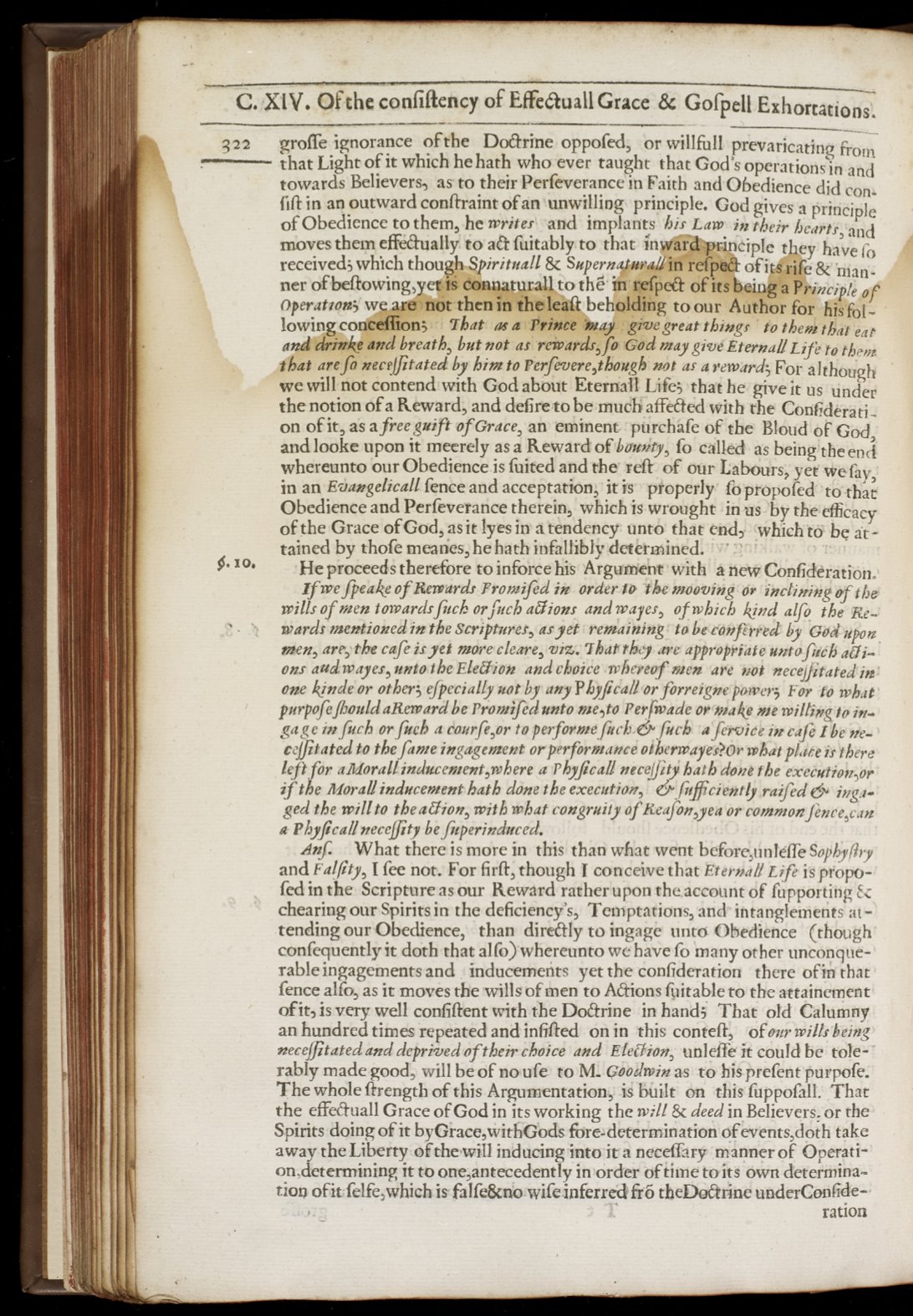

C. XIV.
Of
the
confiftency
of
Ef
eduall
Grace & Gofpell Exhortations.
322
groffe
ignorance
ofthe
Do
&rive
oppofed,
or
willfull prevaricating
from
that
Light
of
it
which
he
hath
who ever
taught that
God's operations
in
and
towards
Believers,
as
to their Perfeverance
in
Faith and Obedience did
con-
fill'
in
an
outward
confiraint
of
an
'unwilling principle. God
gives
a
principle
of
Obedience
to
them,
he writes
and implants his
Law in their hearts,
and
moves
them
effectually
to
at
fuitably
to that
in
ár
^principle
they
have
fo
received; which though
Spirituals & Supernatural/ in refpe&
of
its rife &
man-
ner
of
beftowing,yet
is
connaturall
to thé in
refpc
t
of
its
being
a
Principle
of
Operations
we are
not then
in
theleaft
beholding
to
our Author for
his
fol-
lowing conceffion;
That
as
a Prince
May
givegreat things
to these
that eat
and
drinke
and
breath, but not
as rewards,
fo
God
may
give
EternaliLife
to
there
that
are
fo
necilfitated
by
him
to
rerfevere,though not
as a
rewards
For although
we
will
not contend
with
God about
Eternal'' Life;
that
he give it
us
under
the
notion
ofa
Reward, and
delire
to
be
much
affe&ed
with
the
Confederati-
on
of
it,
as
a
free guift
of
Grace,
an
eminent
purchafe
of
the
Blond
of
God,
and looke upon
it
meerely
as
a
Reward
of
bounty,
fo called
as
being the
end
whereunto
our
Obedience
is
fuited and
the
reff
of
our
Labours, yet
we
fay,
in an
Evangelical/ fence
and acceptation,
it
is
ptoperly
fo
propofed to
that
Obedienceand
Perfeverance therein,
which
is
wrought
in
us by the
efficacy
of
the Grace
of
God,
as
it
lyes
in atendency unto
that end,
Which
to be
at-
tained
by
thofe
meanes, hehath infalliblydetermined.
<'
O.
IO.
He
proceeds therefore
to
inforce
his
Argument with
a new Confideratione
'five
fpeake
of
Rewards
Fromifed
in
order to
the
mooning
or
inclining
of
the
wills
of
men
towards
firth
or
fuch atlions and
wayes,
o
f
which
kind
alto
the
lie
-:
wards mentioned
in
the Scriptures,
as
yet
remaining
to
be
conferred
by
God
upon,
men,
are,
the cafe
is
yet
more
cleare,
viz.
That
they
are appropriate untofiséll
alli-
ons
audwayes,
unto the Elet ion
and
choice
whereof
men
are not neceffitated
in:
one
kinde
or other;
efpecially not by any
Phyficall or
forreigne
power; For to
what'
purpofe
fhould aReward
be
Promfed
unto me,to Perfwade
or
make me wilting
to in-
gage
infuch
or
fueh
a courfe,or to performe fetch-&
fucb
a
fervice
ist cafe
¡be
ne-
ceffitated
to
the
fame
ingagement
or
performance
oéherwayes
?or
what
place
is
there
left
for
aMorall:inducement,where a
Phyficall
nece
fity
hath
done
the
execution,or
if
the Moral/inducement
hath
done
the execution,
&
fufzcientlly
raifed
6
inga-
ged the
will
to
the
allion,
with what
congruity
of
lteafon,yea or
common
fence,can
a
Phyficall
neceff/ty
be
fuperinduced.
Anf.
What
there
is
more
in this
than what went
before,unleffe
Sophyfiry
and
Fal
/ty,
I fee
not. For
firlt;
though I conceive
that
Eternal/
Life is
peopo
fed in
the
Scripture
as
our
Reward rather
upon the.account
of
fupporting &
chearing
our
Spirits in
the
deficiency's,
Temptations,
and intanglements
at-
tendingour
Obedience,
than
direly
to
ingage
unto
Obedience
(though
confequently
it
doth that alto)
whereunto
we have
fo
many
other
unconque-
rable
ingagements and inducements yet the
confederation
there
of
in
that
fence
allo,
as
it
moves the wills
of
men
to
A
&ions
foitable
to the attainement
of
it,
is
very well
confiffent with
the
Do&rine
in
hand;
That
old Calumny
an
hundred
times repeated and inlifted on
in
this
conteff, ofonr
wills
being
neceffitated
and
deprived
oftheir
choice
and Fich
an,
unleffè it could be
tole-
rably
made good,
will
be
ofnoufe
to
M.
Goodwin as
to
his
prefentpurpofe.
The
wholeffrength
of
this
Argumentation,
is
built
on
this fuppofall.
That
the
effe&uall
Grace
of
God
in
its
working the
will &
deed
in Believers,
or
the
Spirits
doing
of
it
byGrace,withGods
fore-
determination ofevents,doth
take
away
the
Liberty
ofthewill
inducing
into it
a neceffary
manner
of
Operati
on,determining it to one,antecedently
in
order
of
time
to
its
own determina-
tion
of
it:felfe,which
is
falfe
&no
-
wife
inferredfió
theDo&rine underConfide-
ration










